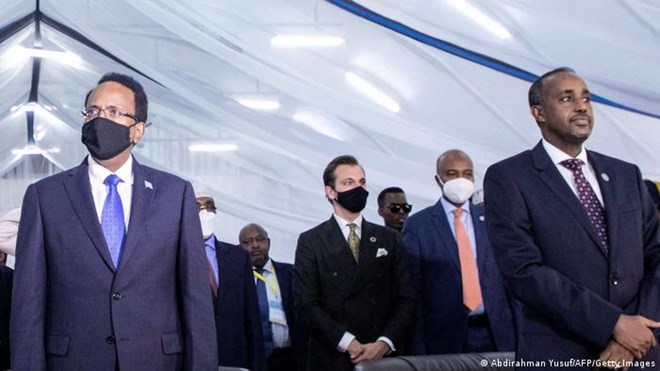On Sunday, militants overran the Af Urur military base in Somalia’s north, murdering four soldiers in the latest round of conflict.
That ambush comes just a week after two devastating attacks: one on the Halane base near Mogadishu’s airport and twin explosives in Beledweyne, central Somalia, which killed 48 people and injured over 100 others.
Among those slain in the Beledweyne explosions was Amina Mohamed Abdi, a prominent opposition politician and outspoken government opponent.
Al-Shabab claimed responsibility for the attacks, which it said were carried out to target politicians running in Somalia’s elections, which are already more than a year overdue.
The lower house election, which has been ongoing for several months, is now set to take place.
After his tenure expired in April 2021, President Mohamed Abdullahi Mohamed, better known as Farmaajo, extended his mandate for another two years with no agreement on how to succeed him.
Since then, Farmaajo has been at odds with Prime Minister Mohamed Hussein Roble, who accused him of staging a “attempted coup” when he extended his tenure.
According to Hussein Sheik-Ali, a former national security adviser who is now the chairman of the Hiraal Institute, a Somalia-based security think tank, political infighting between the two has given the militants full reign to operate.
“This uptick in attacks occurs on a regular basis when they [al-Shabab] sense the government’s vulnerability,” Hussein explained. “Because of the extended electoral debate, they aim to infiltrate and disrupt elections.
Al-Shabab takes advantage of the situation.
Former federal planning minister Abdirahman Aynte told DW that the political battle between the president, who was elected in 2017, and the prime minister, who was elected in 2018, has caused confusion over who is in charge of security forces.
He claims that Al-Shabab is attempting to profit from this.
“There is no question that al-Shabab will utilize a situation like that if there is a disagreement and infighting among political elites,” Aynte said.
“They’ve been doing it for over a decade because the country’s security forces have become extremely politicized in recent months and have been focused to carrying out politically driven security operations rather than operations against terrorist groups,” he explained.
The mission of the African Union is coming to an end.
Al-Shabab insurgents connected to al-Qaeda are attempting to establish an Islamic state in Somalia.
They intend to destabilize the federal administration in Mogadishu and oppose the African Union-led AMISOM military mission’s presence in the Horn of Africa country.
Al-Shabab once controlled huge swathes of Somalia, but AMISOM forces drove them out of Mogadishu and much of southern Somalia.
Despite these failures, al-Shabab has “notched up a string of brutal wins” against both Somali targets and AMISOM troops, according to a recent analysis of the al-Shabab threat by the International Crisis Group.
The increase in al-Shabab assaults coincides with AMISON’s mandate expiring on March 31.
AMISOM to ATMIS is a transition from AMISOM to ATMIS.
AMISOM troops are being withdrawn.
The withdrawal of AMISOM troops was originally planned for December 2020, but it has been postponed several times.
Now, instead of a complete withdrawal, AMISOM is to be replaced by a transitional AU mission, known as ATMIS, on April 1.
Somali security forces are scheduled to only take over all responsibilities in December 2024.
Civil society activist Hodman Ahmed is worried that prolonging the AU-led mission with a transitional period will continue the cycle of violence in her country.
She said it was no coincidence that Somalia adopted a revised transition plan for the ATMIS mission only a day before gunmen tried to gain entry to the Halane base camp, which houses AMISOM, the United Nations and other international agencies.
At the same time, the resumption of the “explosions and killings prolongs AMISOM’s presence” in the country, she said.
Vital elections
Voices inside and outside of Somalia are calling for the elections to be finalized as soon as possible to help bring stability
Aynte said the delayed elections had significantly contributed to the uptick in violence and the overall insecurity.
“We know that, if this election can be completed in the next maybe two to three months at most, a new empowered administration would certainly be able to dedicate both financial and manpower resources to fight al-Shabab,” Aynte said.
He acknowledged that the presidential vote won’t be smooth.
“It’ll be a very bumpy ride. But, in Somalia, we have gotten used to that,” Aynte said.
“

